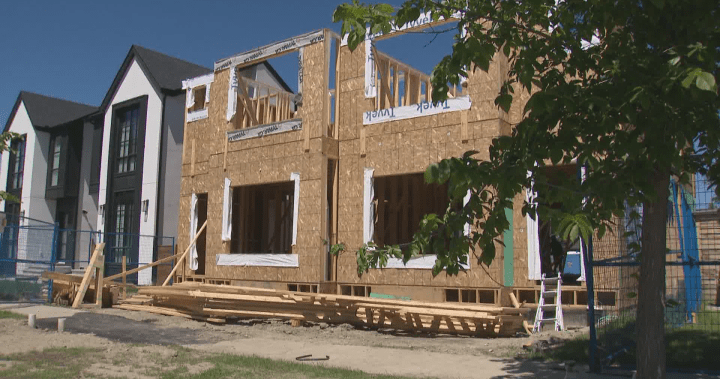The majority of candidates vying to be Calgary’s next mayor are vowing to repeal citywide rezoning, as another neighbourhood explores restrictive covenants as an option to block development spurred by the policy.
A restrictive covenant is a legally binding agreement on a property title that limits how a property is used or developed, even after it is sold to a new owner.
Restrictive covenants are frequently used by municipalities, developers, and landowners to ensure land is developed in a manner that maintains or enhances the value of neighbouring properties, according to Alberta Municipalities.

Former city councillor Jeromy Farkas, running for mayor a second time, unveiled his housing platform Wednesday.
The 25-point plan includes the creation of a renter support office, the streamlined approval for family-oriented housing, protection for park space and prioritizes transit-oriented development.
The first policy point is to “repeal and replace blanket rezoning,” with a more targeted community strategy that “supports gentle density” while building a more affordable homes.
“It’s very clear that this blanket rezoning, all-size-fits-all approach hasn’t worked. It hasn’t been able to build the homes at the scale or the speed or the price point that’s needed,” Farkas told Global News.
“We think that we can get more homes built more cost effectively and faster with that targeted approach.”
Farkas becomes the latest mayoral candidate to promise scrapping the citywide rezoning policy along with Communities First candidate and Ward 1 Coun. Sonya Sharp and former city councillor Jeff Davison.

Get breaking National news
For news impacting Canada and around the world, sign up for breaking news alerts delivered directly to you when they happen.
“We have to rebuild trust with the public and we’ve got to repeal that bylaw,” Davison told Global News. “We’ve got to work with all stakeholders to say, ‘What’s the plan? What do we want as a housing initiative going forward for Calgary and what works for Calgarians?’”
Farkas’ promise to repeal citywide rezoning prompted a response from Ward 8 Coun. Courtney Walcott, who is not running for re-election.
“Seeing prominent candidates and parties retreat to policies of exclusionary zoning, discrimination, and economic segregation under the guise of ‘progress’ and ‘compassion’ is painful,” Walcott wrote on social media.
“Have some courage, it might just inspire people.”
Calgary city council voted in favour of a bylaw to change the city’s default residential zoning last year, which amended the land-use bylaw to allow a variety of housing types including single-detached, semi-detached, duplexes and rowhouses on a single property.
The move followed a record public hearing at city hall in which the majority of speakers opposed the policy change.

Experts suggest it’s those frustrated Calgarians that candidates against citywide rezoning are trying to tap into.
“Those folks are motivated, they’re going to donate, they’re going to volunteer, they are going to come out and vote, and it may be that in some places, this is an issue that really gets voters out,” said Lori Williams, an associate professor of policy studies at Mount-Royal University.
“It’s also tricky when you’re a mayoral candidate, because you’ve got to appeal to people throughout the city.”
That frustration is coming to a head in the southwest community of Lakeview, where a group of residents is pushing to have neighbours sign restrictive covenants on their properties.
According to Keith Marlowe with the Lakeview Restrictive Covenant Initiative, the effort was spurred by city council’s decision and three recent developments in the area.
“I think that’s what is getting people’s backs up. The community was very strong that they didn’t want upzoning and that was seemingly ignored for whatever reason by city council,” Marlowe said.
Marlowe said the restrictive covenant would remain on a property’s title for 75 years.
“We’re all voluntarily agreeing to put certain restrictions on our own ability to develop our property in the hopes that it helps our neighbours as well,” he said.
When asked about Lakeview’s push for restrictive covenants on Tuesday, Calgary Mayor Jyoti Gondek said property owners can do what they want with their own properties.
“Anytime there’s an individual that’s interested in doing something with their private property, it’s something that’s up to that individual,” Gondek said.
“Individuals are able to do what they choose with their properties as long as it abides with any given bylaw and within the rules of the law.”

According to the city, citywide rezoning has “significantly increased the diversity and supply of housing options in Calgary.”
City data shows 271 applications were submitted for new homes in established communities in the first quarter of 2025, a 59-per cent increase over the same time period last year.
Thirty-one per cent of those applications were rowhouses and townhomes, a 163-per cent increase from the same quarter in 2024.
A city briefing note into the matter also suggests citywide rezoning enabled nearly half or 45 per cent of all new low-density housing development permits in established neighbourhoods.
Calgary’s next municipal election is on Oct. 20.
© 2025 Global News, a division of Corus Entertainment Inc.



